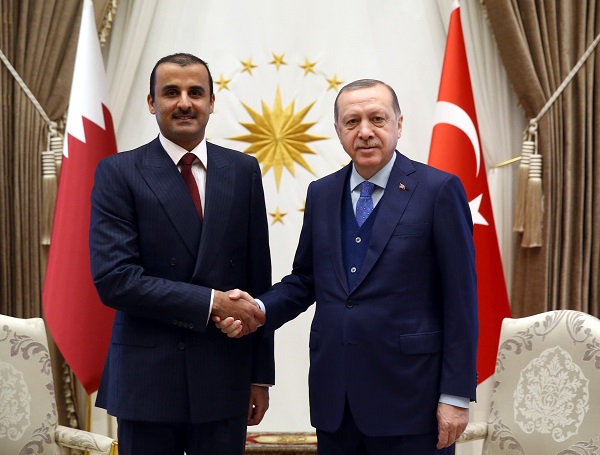Alwaght- In his first foreign trip since the outbreak of the coronavirus, Turkish President Recep Tayyip Erdogan paid an official visit to Qatar on July 2.
In the trip, which was important symbolically and also in terms of the regional developments, Erdogan met with Emir of Qatar Sheikh Tamim bin Hamad Al Thani.
What does the Turkish President seek behind this visit? What were the key topics of discussion between the two leaders? To answer these questions, three essential goals need to be taken into account?
Expanding bilateral ties
Without any doubt, the key point in the Erdogan-Thani negotiations was the increase in the volume of economic ties and the Qatari investment in Turkey. After Qatar was sanctioned by the Saudi-led Arab block in June 2017, the Turkish-Qatari relations experienced a sharp increase, with the Turkish exports to Qatar witnessing 99 percent growth.
While Turkey was hit by an economic crisis due to its currency value loss in 2018, Qatar injected some $15 billion in the Turkish economy to help the country away from economic collapse. Over the past two years, the emir of Qatar invested heavily in the Turkish banking sector, real estate market, hotels, and other businesses in a move to return the favor to Erdogan.
Also, their cooperation and economic agreements in recent months are also eye-catching. Since earlier this year and as the pandemic crisis hit Turkey, the country’s foreign currency reserve shrank $17 billion, decreasing to $89.2 billion. The national currency lira’s value in late May and early June suffered severe losses.
This loss made Ankara in desperate need for Qatar’s help. Shortly late, the two countries signed an agreement to boost banking and currency dealings, making them reach $15 billion.
According to economic observers, the tripling of dealing with Doha added some $10 billion to the Turkish hard currency reserves. Although Turkey’s central bank stated that the agreement came to boost trade between the two partners, the main goal unquestionably was to give a hand to Turkey to weather the currency crisis it was living. Following the announcement of the agreement with Qatar, the lira gained 0.3 percent in value, with each lira dealing 6.79 for each US dollar.
Erdogan’s first visit to Qatar after the pandemic crisis demonstrates how significant the economic and trade cooperation with Doha is for Ankara. In fact, Turkey is hopeful that Qatar remains a bankroller for the Turkish economy amid the fight against the coronavirus crisis. In return, Qatar expects Erdogan to continue his diplomatic and logistical support to Doha amid the ongoing crisis between Qatar and the Saudi-headed Arab bloc that includes the UAE, Egypt, and Bahrain.
Sending a message to Saudi Arabia, UAE
The Erdogan’s visit to Doha comes while in recent months, Saudi Arabia and the UAE sent signals to Qatar of willingness to de-escalate the tensions. The signals come while not only the anti-Qatari sanctions were not eased but also amid regional and even international crises and rivalry, the two sides increased their competition.
The increasing complication of the Libyan crisis, which brings Saudi Arabia, Egypt, and the UAE against Turkey, can be one of the factors motivating this visit. By their meeting, the Turkish and Qatari leaders want to make it clear to the opposite side in the Libyan crisis that Ankara and Doha are still allies and hold the same stances. Also, Erdogan sent a message to Riyadh and Abu Dhabi, telling them that Ankara is still a backer to Doha. He wants to tell the Saudis and Emiratis that despite their moves to end the crisis with the Qataris, Ankara remains Doha’s strategic ally in the region’s future political equations.
Turkish-Qatari unity of positions on regional issues
In addition to the above-mentioned goals, Erdogan wants to highlight the united views of the two states on regional cases like the Yemen war, Palestinian cause, and the Syrian conflict. They were also discussed during the meeting between Erdogan and Sheikh Tamim.
In the first place, the Qataris sent the international and regional actors involved in the Syrian crisis a message that in the Idlib case Doha still supports political and military policies adopted by Ankara and its militant loyalists.
Also, amid the Israeli plan to annex West Bank to the already-occupied Palestinian territories and the Trump administration push to implement the “deal of the century”, which wants to recognize the Israeli occupation and scrap the Palestinian refugees’ right to return home, the two leaders want to underscore their unity of stances against the Israeli occupation and Trump’s plan to nix the Palestinian cause.
Furthermore, it seems that the two countries have reached the conclusion that they need to take a more transparent posture against Saudi aggression against Yemen.
In March 2015, Saudi Arabia along with the UAE and some other allied Arab states waged a war against neighboring Yemen. The war so far killed thousands of Yemeni civilians, wounded more, and displaced millions, as unceasing bombardment targets residential areas and infrastructure.
As Erdogan visited Qatar, Turkey's ambassador to the UN Feridun Sinirlioğlu accused on Wednesday the UAE of embarking on a campaign to stifle democratic movements in the region, citing Abu Dhabi's "excessive ambition" to dominate the wider region "resulted in nothing but human suffering." He added that the UAE was accomplice to killing of Yemeni children.



























